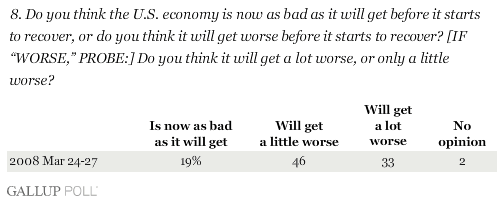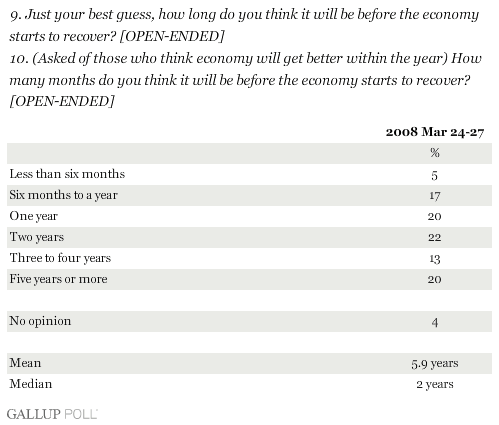PRINCETON, NJ -- A majority of Americans, 55%, think it will be two or more years before the U.S. economy starts to recover.
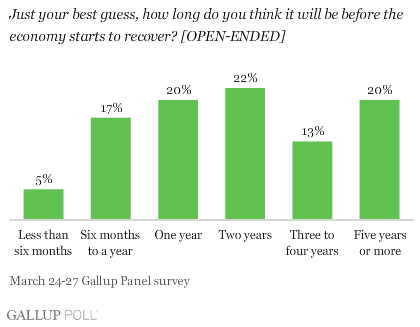
Gallup asked a nationally representative sample of Americans drawn from its household panel how long they think it will be before the economy starts to recover. The question was asked in an open-ended fashion, so respondents could give any time estimate they chose.
Only about one in five think the economy will begin to recover quickly -- within the next 12 months. An additional 20% think it will be at least a year before it starts to recover. The majority, though, expects a longer period of tough economic times, lasting two years or more in duration. That includes 20% who expect that it will be five years or longer before improvement is seen.
The median -- or typical -- expectation is that it will be two years before the economy turns around. The average estimate is 5.9 years, in part because some very pessimistic respondents essentially believe the economy will not get better for several generations.
Republicans are much more optimistic than Democrats or independents about the prospects for economic recovery. Whereas 63% of Democrats and 60% of independents expect the bad times to last for two or more years, only 41% of Republicans do.
Has the Bottom Been Reached?
Not only do Americans believe it will be years before the economy starts to get better, they also think it is in fact likely to deteriorate further before turning around. The poll finds that most Americans do not believe the bottom of the economic downturn has been reached -- just 19% say the economy is now as bad as it will get. The vast majority -- 79% -- expect it will get worse before it starts to recover, with 46% saying it will get "a little worse" and 33% saying it will get "a lot worse."
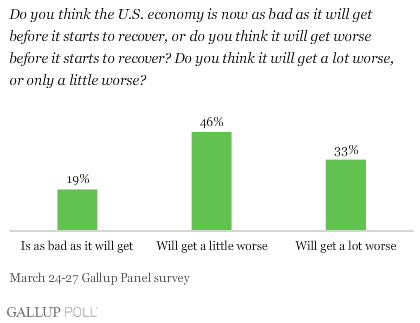
Even a majority of Republicans, 65%, expect the economy to deteriorate further. Many more independents (85%) and Democrats (87%) believe the bottom has not yet been reached.
Economy Surpasses Iraq as Top Priority for Government
In recent months, the economy has surpassed the Iraq war as the most important problem facing the country in Americans' eyes. The panel survey shows it has also passed Iraq as the public's top priority for the president and Congress to deal with at this time.
Forty-eight percent of Americans rate the economy in general terms as the government's top priority. That figure does not include more specific mentions of economic problems such as unemployment, inflation, or recession, to name a few, which would push economic concerns above the majority level. Forty-two percent rate the Iraq war as the top government priority. Healthcare is a distant third at 21%, with fuel prices and energy (10%) and immigration (8%) rounding out the top five issues.
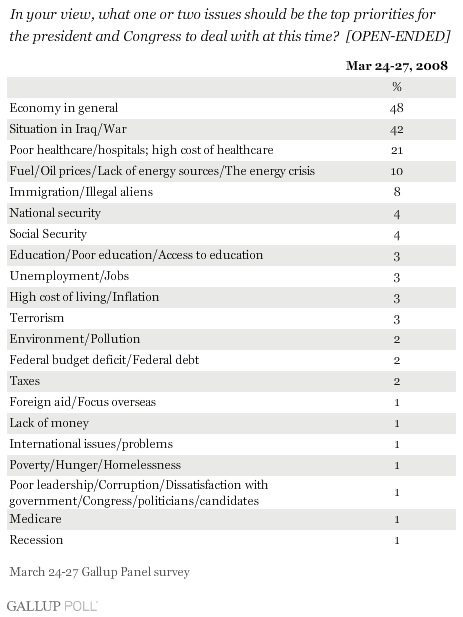
In December, when the question was last asked, 55% said the war should be the government's top issue and 22% the economy. The Iraq war had topped the list every time Gallup asked this question, beginning in April 2006.
Survey Methods
Results for this Gallup Panel study are based on telephone interviews with 1,005 national adults, aged 18 and older, conducted March 24-27, 2008. Gallup Panel members are recruited through random selection methods. The panel is weighted so that it is demographically representative of the U.S. adult population. For results based on this sample, one can say with 95% confidence that the maximum margin of sampling error is ±4 percentage points. In addition to sampling error, question wording and practical difficulties in conducting surveys can introduce error or bias into the findings of public opinion polls.
Interviews are conducted with respondents on land-line telephones (for respondents with a land-line telephone) and cellular phones (for respondents who are cell-phone only).
In addition to sampling error, question wording and practical difficulties in conducting surveys can introduce error or bias into the findings of public opinion polls.
